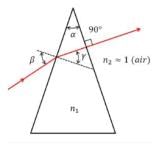Test: Total Internal Reflection - JEE MCQ
10 Questions MCQ Test - Test: Total Internal Reflection
Carbon disulfide (n = 1.63) is poured into a container made of crown glass (n = 1.52). What is the critical angle for internal reflection of a ray in the liquid when it is incident on the liquid-to-glass surface?
What is the relation between critical angle and refractive index?
Which of the following phenomena takes place inside an optical fiber ?
Light is confined within the core of a simple optical fiber by:
The critical angle for the material of a prism is 45° and its refracting angle is 30°. A monochromatic ray goes out perpendicular to the surface of emergence from the prism. What is the angle of incidence on the prism?
We have a right angled isosceles prism, Its refractive index is 1.5. If we incident a ray normally on one of the two perpendicular surfaces, which of the following phenomenon will take place?
Total internal reflecting mirrors are preferred over plane mirrors because















